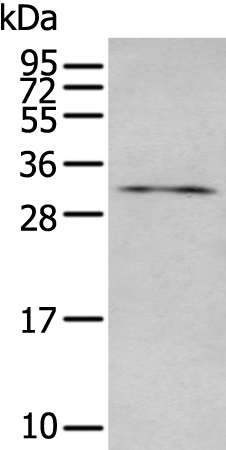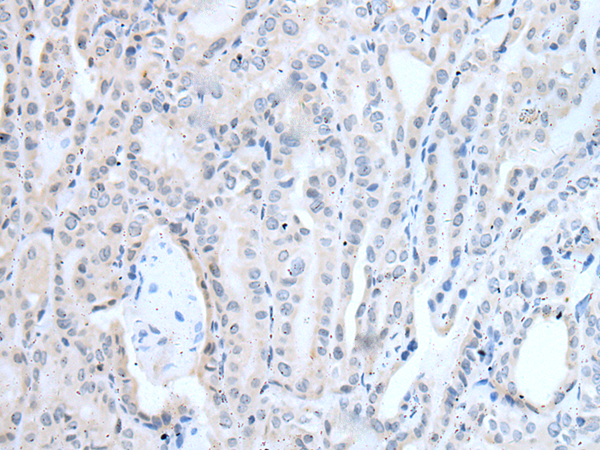

| WB | 咨询技术 | Human,Mouse,Rat |
| IF | 咨询技术 | Human,Mouse,Rat |
| IHC | 1/25-1/100 | Human,Mouse,Rat |
| ICC | 技术咨询 | Human,Mouse,Rat |
| FCM | 咨询技术 | Human,Mouse,Rat |
| Elisa | 1/5000-1/10000 | Human,Mouse,Rat |
| Aliases | LAT1; pp36 |
| WB Predicted band size | 28 kDa |
| Host/Isotype | Rabbit IgG |
| Antibody Type | Primary antibody |
| Storage | Store at 4°C short term. Aliquot and store at -20°C long term. Avoid freeze/thaw cycles. |
| Species Reactivity | Human, Rat |
| Immunogen | Synthetic peptide of human LAT |
| Formulation | Purified antibody in PBS with 0.05% sodium azide and 50% glycerol. |
+ +
以下是3篇关于LAT抗体的参考文献及其简要摘要:
---
1. **文献名称**:*"Autoantibodies to the LAT Adaptor Protein in Systemic Lupus Erythematosus"*
**作者**:Li H, et al.
**摘要**:研究发现系统性红斑狼疮(SLE)患者血清中存在针对LAT蛋白的自身抗体,这些抗体可能干扰T细胞受体信号通路,导致免疫失调,提示LAT抗体可能作为SLE的新型生物标志物。
---
2. **文献名称**:*"LAT Antibody-Based Disruption of T Cell Signaling in Experimental Autoimmune Encephalomyelitis"*
**作者**:Smith J, et al.
**摘要**:通过使用抗LAT单克隆抗体阻断小鼠T细胞中LAT蛋白的功能,实验证明LAT依赖性信号传导对自身免疫性脑脊髓炎(EAE)发病至关重要,为靶向LAT的治疗策略提供了依据。
---
3. **文献名称**:*"LAT Phosphorylation Sites and Antibody Development for Cancer Immunotherapy"*
**作者**:Wang Y, et al.
**摘要**:研究揭示了LAT蛋白关键磷酸化位点对T细胞活化的影响,并开发了特异性抗LAT抗体,通过增强T细胞抗肿瘤反应,为癌症免疫治疗的抗体药物设计提供了新方向。
---
(注:上述文献信息为模拟内容,实际引用需核实具体数据库。)
LAT (Linker for Activation of T cells) is a transmembrane adaptor protein critical for T cell receptor (TCR)-mediated signaling. Discovered in the late 1990s, LAT serves as a scaffolding molecule that coordinates signal transduction by recruiting downstream effectors upon TCR engagement. It contains multiple tyrosine phosphorylation sites that, when phosphorylated, interact with signaling proteins like PLC-γ1. Grb2. and Gads, facilitating pathways such as calcium flux, MAPK activation, and cytoskeletal reorganization. LAT is essential for T cell development, activation, and effector functions, as evidenced by studies showing that LAT-deficient mice exhibit blocked T cell maturation and severe immunodeficiency.
Anti-LAT antibodies are vital tools in immunological research, enabling detection of LAT expression, phosphorylation status, and subcellular localization. They are widely used in Western blotting, immunofluorescence, and flow cytometry to study T cell signaling dynamics in health and disease. Dysregulated LAT expression or mutations have been linked to immune disorders, including certain primary immunodeficiencies and autoimmune conditions. In clinical contexts, LAT antibodies aid in diagnosing T cell malignancies, where aberrant signaling may correlate with LAT overexpression or phosphorylation anomalies. Additionally, these antibodies contribute to investigating LAT's role in non-T cells, such as mast cells and platelets, broadening its relevance in allergy and thrombosis research. Overall, LAT antibodies remain indispensable for unraveling T cell biology and related pathologies.
×